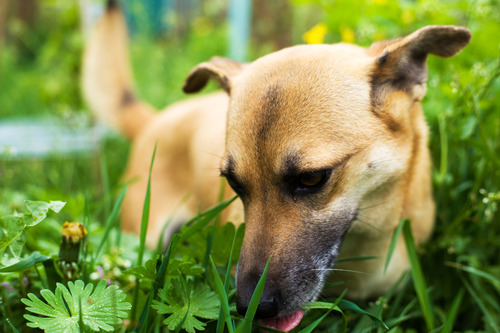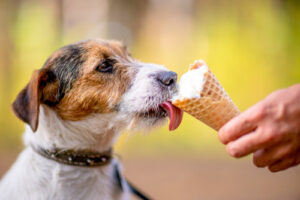It can be surprising to glance out at your yard and see your dog munching on grass like it’s part of their daily menu. Many pet owners ask the same question: why do dogs eat grass? While it may seem strange, this behavior is actually quite common among dogs of all breeds and ages. Some owners find it amusing, while others worry it might be a sign of illness. At Arvada Veterinary Hospital, our team can help you understand why dogs eat grass to help you feel more at ease and know when it’s worth reaching out to your veterinarian for guidance.
Is Eating Grass Normal for Dogs?
Many dogs eat grass from time to time, and most veterinarians consider it a relatively normal behavior. Surveys of dog owners reveal that a large percentage of dogs snack on grass occasionally, and in many cases, these dogs appear perfectly healthy. This makes the question “Why do dogs eat grass?” one of the most frequently asked by pet owners. Some dogs may eat grass regularly, while others only nibble once in a while. For many pets, it might be more of a habit than a sign of a deeper problem. Still, since every dog is different, it’s always a good idea to pay attention to how often this happens and whether it’s paired with other changes in behavior or appetite.
Possible Reasons Why Dogs Eat Grass
While the exact reason dogs eat grass is still debated, there are several possible explanations that experts consider likely.
A Natural Instinct
One common theory is that dogs eat grass because it’s instinctive. Before domestication, wild canines were known to consume entire prey animals, including the stomach contents of herbivores. This often contained grass and plant matter. Today’s dogs may carry that same natural tendency, leading them to nibble grass even though their diet is already balanced.
Curiosity and Exploration
Dogs explore the world through their senses, and taste is part of that exploration. Puppies in particular may try eating grass out of curiosity, just as they test other objects around them. For these dogs, eating grass may be nothing more than experimenting with different textures and flavors.
Boredom or Attention-Seeking
Another reason dogs eat grass could be boredom. If a dog doesn’t have enough stimulation, they might chew grass as a way to pass the time. In some cases, dogs notice their owners react strongly when they eat grass, and they may continue doing it as a way of getting attention.
Does Eating Grass Mean a Dog Feels Sick?
One of the most common beliefs is that dogs eat grass when they feel unwell or want to vomit. While some dogs do vomit after eating grass, research suggests this is not always the case. Many dogs eat grass without showing any signs of stomach upset, while others may vomit afterward but not every time. Some veterinarians think grass may occasionally help dogs soothe mild digestive discomfort. However, this doesn’t apply to every dog, and grass-eating should not be assumed to be a natural cure for stomach issues.
If your dog eats grass frequently and shows additional symptoms such as lethargy, repeated vomiting, diarrhea, or a loss of appetite, it’s important to reach out to your veterinarian in Arvada. You can call (303) 424-4439 to schedule an appointment at Arvada Veterinary Hospital.
Why Do Some Dogs Prefer Fresh Grass?
Some dogs show a preference for soft, fresh blades of grass instead of dry patches. This raises the question again: why do dogs eat grass selectively? Fresh grass is softer, more fragrant, and may be easier to chew. Dogs may simply enjoy the taste or texture of new growth. Seasonal changes also play a role. Many owners notice their dogs eat more grass during spring and early summer when lawns are lush and green.
Could Eating Grass Be Related to Diet?
Pet owners often ask whether eating grass means their dog’s diet is missing something. The short answer is that most dogs who eat grass are already on balanced, nutritious diets. Commercial pet foods today are carefully formulated to meet dogs’ nutritional needs, which means eating grass is rarely a sign of deficiency.
Fiber Considerations
Some experts suggest that grass may provide extra fiber, which can aid digestion. A dog might turn to grass if they feel the need for more roughage in their diet. However, this is just one possible explanation and not proven for every case.
Habit vs. Hunger
In other situations, eating grass could be more of a routine or comfort habit rather than a response to hunger. Even well-fed dogs may graze on grass without any connection to their diet.
Can Eating Grass Be Harmful?
While grass-eating itself is not usually dangerous, there are certain risks to be aware of. The concern isn’t so much why dogs eat grass but rather what might be on the grass.
Pesticides and Chemicals
Lawns treated with pesticides, herbicides, or fertilizers can pose a risk if a dog ingests treated grass. These chemicals may irritate the digestive system or cause more serious health problems.
Parasites and Contamination
Grass can also harbor parasites such as roundworm or hookworm larvae, especially in areas where other animals frequent. If a dog consumes contaminated grass, they may be exposed to intestinal parasites. For this reason, if your dog has a habit of eating grass, it’s safest to monitor where they graze and prevent access to treated or contaminated lawns.
How Common Is Grass-Eating in Dogs?
Many pet owners feel concerned when their dog eats grass, but this behavior is widespread. Studies indicate that a significant majority of dogs eat grass at some point, making it one of the most frequent canine habits. The key point to keep in mind is that grass-eating alone doesn’t usually indicate a major health concern. Instead, it’s a behavior that raises interesting questions, like why do dogs eat grass so often compared to other plants? Researchers believe this may simply be due to grass being the most available and accessible plant in a dog’s environment.
When Should You Talk to Your Veterinarian?
Although grass-eating is common, there are situations where it’s worth calling your veterinarian. If your dog eats grass obsessively, vomits frequently afterward, or shows other changes in health, it’s best to schedule a checkup. At Arvada Veterinary Hospital, our team is here to provide insight into your dog’s behavior and overall health. If you find yourself continuing to ask “Why do dogs eat grass?” and you feel concerned about your pet, call (303) 424-4439 or book an appointment online.
Supporting Your Dog’s Health in Arvada
While the exact answer to “Why do dogs eat grass?” may not be the same for every pet, it’s a behavior many dogs share. For most, it’s a harmless quirk, but it’s always good to stay aware of possible risks and to talk to your veterinarian if you notice changes in your dog’s habits. If you’d like professional guidance about your dog’s grass-eating behavior or other aspects of their health, the team at Arvada Veterinary Hospital in Arvada, CO is ready to help. Call us today at (303) 424-4439 or book an appointment online for compassionate, knowledgeable veterinary care.





